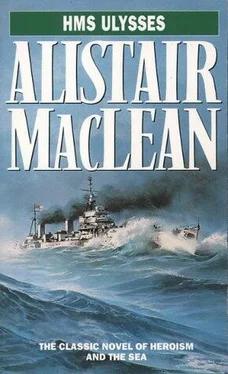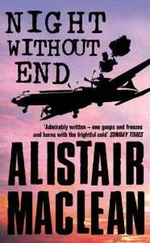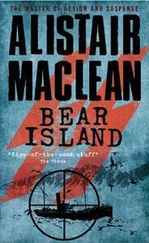Alistair MacLean - HMS Ulysses
Здесь есть возможность читать онлайн «Alistair MacLean - HMS Ulysses» — ознакомительный отрывок электронной книги совершенно бесплатно, а после прочтения отрывка купить полную версию. В некоторых случаях можно слушать аудио, скачать через торрент в формате fb2 и присутствует краткое содержание. Жанр: prose_military, на английском языке. Описание произведения, (предисловие) а так же отзывы посетителей доступны на портале библиотеки ЛибКат.
- Название:HMS Ulysses
- Автор:
- Жанр:
- Год:неизвестен
- ISBN:нет данных
- Рейтинг книги:3 / 5. Голосов: 1
-
Избранное:Добавить в избранное
- Отзывы:
-
Ваша оценка:
- 60
- 1
- 2
- 3
- 4
- 5
HMS Ulysses: краткое содержание, описание и аннотация
Предлагаем к чтению аннотацию, описание, краткое содержание или предисловие (зависит от того, что написал сам автор книги «HMS Ulysses»). Если вы не нашли необходимую информацию о книге — напишите в комментариях, мы постараемся отыскать её.
HMS Ulysses — читать онлайн ознакомительный отрывок
Ниже представлен текст книги, разбитый по страницам. Система сохранения места последней прочитанной страницы, позволяет с удобством читать онлайн бесплатно книгу «HMS Ulysses», без необходимости каждый раз заново искать на чём Вы остановились. Поставьте закладку, и сможете в любой момент перейти на страницу, на которой закончили чтение.
Интервал:
Закладка:
The last echo of the Viking's guns had barely died away before they heard the roar of the engines of the Condor, at maximum throttle in a shallow dive. For five, perhaps ten seconds-it seemed longer than that, but not long enough for any gun in the convoy to begin tracking him accurately-the great Focke-Wulf actually flew beneath his own flare, and then was gone. Behind him, the sky opened up in a blinding coruscation of flame, more dazzling, more hurtful, than the light of the noonday sun. So intense, so extraordinary the power of those flares, so much did pupils contract and eyelids narrow in instinctive self-protection, that the enemy bombers were through the circle of light and upon them before anyone fully realised what was happening The timing, the split-second co-operation between marker planes and bombers were magnificent.
There were twelve planes in the first wave. There was no concentration on one target, as before: not more than two attacked any ship. Turner, watching from the bridge, watching them swoop down steeply and level out before even the first gun in the Ulysses had opened up, caught his breath in sudden dismay. There was something terribly familiar about the speed, the approach, the silhouette of these planes. Suddenly he had it, Heinkels, by God! Heinkel 111's. And the Heinkel 111, Turner knew, carried that weapon he dreaded above all others, the glider bomb.
And then, as if he had touched a master switch, every gun on the Ulysses opened up. The air filled with smoke, the pungent smell of burning cordite: the din was indescribable. And all at once, Turner felt fiercely, strangely happy.... To hell with them and their glider bombs, he thought. This was war as he liked to fight it: not the cat-and-mouse, hide-and-seek frustration of trying to outguess the hidden wolf-packs, but war out in the open, where he could see the enemy and hate him and love him for fighting as honest men should and do his damnedest to destroy him. And, Turner knew, if they could at all, the crew of the Ulysses would destroy him. It needed no great sensitivity to direct the sea-change that had overtaken his men-yes, his men now: they no longer cared for themselves: they had crossed the frontier of fear and found that nothing lay beyond it and they would keep on feeding their guns and squeezing their triggers until the enemy overwhelmed them.
The leading Heinkel was blown out of the sky, and fitting enough it was 'X' turret that destroyed it, 'X' turret, the turret of dead marines, the turret that had destroyed the Condor, and was now manned by a scratch marine crew. The Heinkel behind lifted sharply to avoid the hurtling fragments of fuselage and engines, dipped, flashed past the cruiser's bows less than a boat-length away, banked steeply to port under maximum power, and swung back in on the Ulysses. Every gun on the ship was caught on the wrong foot, and seconds passed before the first one was brought to bear-time and to spare for the Heinkel to angle in at 60ø, drop his bomb and slew frantically away as the concentrated fire of the Oerlikons and pom-poms closed in on him. Miraculously, he escaped.
The winged bomb was high, but not high enough. It wavered, steadied, dipped, then glided forwards and downwards through the drifting smoke of the guns to strike home with a tremendous, deafening explosion that shook the Ulysses to her keel and almost shattered the eardrums of those on deck.
To Turner, looking aft from the bridge, it seemed that the Ulysses could never survive this last assault. An ex-torpedo officer and explosives expert himself, he was skilled in assessing the disruptive power of high explosive: never before had he been so close to so powerful, so devastating an explosion. He had dreaded these glider bombs, but even so he had under-estimated their power: the concussion had been double, treble what he had been expecting.
What Turner did not know was that what he had heard had been not one explosion but two, but so nearly simultaneous as to be indistinguishable. The glider bomb, by a freakish chance had crashed directly into the port torpedo tubes. There had been only one torpedo left there, the other two had sent the Vytura to the bottom, and normally Amatol, the warhead explosive, is extremely stable and inert, even when subjected to violent shock: but the bursting bomb had been too close too powerful: sympathetic detonation had been inevitable.
Damage was extensive and spectacular: it was severe, but not fatal. The side of the Ulysses had been ripped open, as by a giant can-opener, almost to the water's edge: the tubes had vanished: the decks were holed and splintered: the funnel casing was a shambles, the funnel itself tilting over to port almost to fifteen degrees; but the greatest energy of the explosion had been directed aft, most of the blast expending itself over the open sea, while the galley and canteen, severely damaged already, were no more than a devil's scrapyard.
Almost before the dust and debris of the explosion had settled, the last of the Heinkels was disappearing, skimming the waves, weaving and twisting madly in evasive action, pursued and harried by a hundred glowing streams of tracer. Then, magically, they were gone, and there was only the sudden deafening silence and the flares, drooping slowly to extinction, lighting up the pall above the Ulysses, the dark clouds of smoke rolling up from the shattered Stirling and a tanker with its after superstructure almost gone. But not one of the ships in FR77 had faltered or stopped; and they had destroyed five Heinkels. A costly victory, Turner mused, if it could be called a victory; but he knew the Heinkels would be back. It was not difficult to imagine the fury, the hurt pride of the High Command in Norway: as far as Turner knew, no Russian Convoy had ever sailed so far south before.
Riley eased a cramped leg, stretched it gently so as to avoid the great spinning shaft. Carefully he poured some oil on to the bearing, carefully, so as not to disturb the Engineer Commander, propped in sleep between the tunnel wall and Riley's shoulder. Even as Riley drew back, Dodson stirred, opened heavy, gummed lids.
"Good God above!" he said wearily. "You still here, Riley?" It was the first time either of them had spoken for hours.
"It's a -----, good job I am here," Riley growled. He nodded towards the bearing. "Bloody difficult to get a firehose down to this place, I should think!" That was unfair Riley knew: he and Dodson had been taking it in half-hour turns to doze and feed the bearing. But he felt he had to say something: he was finding it increasingly difficult to keep on being truculent to the Engineer Commander.
Dodson grinned to himself, said nothing. Finally, he cleared his throat, murmured casually: "The Tirpitz is taking its time about making its appearance, don't you think?"
"Yes, sir." Riley was uncomfortable. "Should 'a' been here long ago, damn her!"
"Him," Dodson corrected absently. "Admiral von Tirpitz, you know... Why don't you give up this foolishness, Riley?"
Riley grunted, said nothing. Dodson sighed, then brightened.
"Go and get some more coffee, Riley. I'm parched!"
"No." Riley was blunt. "You get it."
"As a favour, Riley." Dodson was very gentle. "I'm damned thirsty I"
"Oh, all right." The big stoker swore, climbed painfully to his feet."
Where'll I get it?"
"Plenty in the engine-room. If it's not iced water they're swigging, it's coffee. But no iced water for me." Dodson shivered.
Riley gathered up the Thermos, stumbled along the passage. He had only gone a few feet when they felt the Ulysses shudder under the recoil of the heavy armament. Although they did not know it, it was the beginning of the air attack.
Dodson braced himself against the wall, saw Riley do the same, pause a second then hurry away in an awkward, stumbling run. There was something grotesquely familiar in that awkward run, Dodson thought. The guns surged back again and the figure scuttled even faster, like a giant crab in a panic.... Panic, Dodson thought: that's it, panic-stricken. Don't blame the poor bastard-I'm beginning to imagine things myself down here. Again the whole tunnel vibrated, more heavily this time-that must be 'X' turret, almost directly above. No, I don't blame him. Thank God he's gone. He smiled quietly to himself. I won't be seeing friend Riley again-he isn't all that of a reformed character. Tiredly, Dodson settled back against the wall. On my own at last, he murmured to himself, and waited for the feeling of relief. But it never came. Instead, there was only a vexation and loneliness, a sense of desertion and a strangely empty disappointment.
Читать дальшеИнтервал:
Закладка:
Похожие книги на «HMS Ulysses»
Представляем Вашему вниманию похожие книги на «HMS Ulysses» списком для выбора. Мы отобрали схожую по названию и смыслу литературу в надежде предоставить читателям больше вариантов отыскать новые, интересные, ещё непрочитанные произведения.
Обсуждение, отзывы о книге «HMS Ulysses» и просто собственные мнения читателей. Оставьте ваши комментарии, напишите, что Вы думаете о произведении, его смысле или главных героях. Укажите что конкретно понравилось, а что нет, и почему Вы так считаете.












